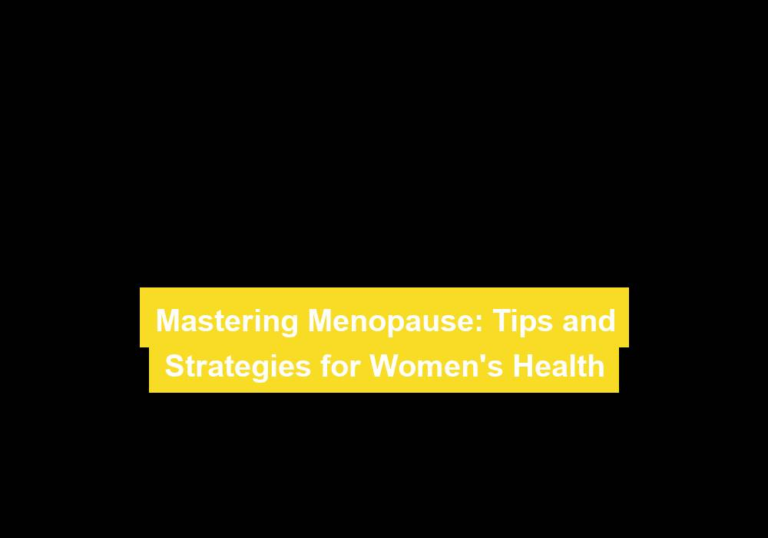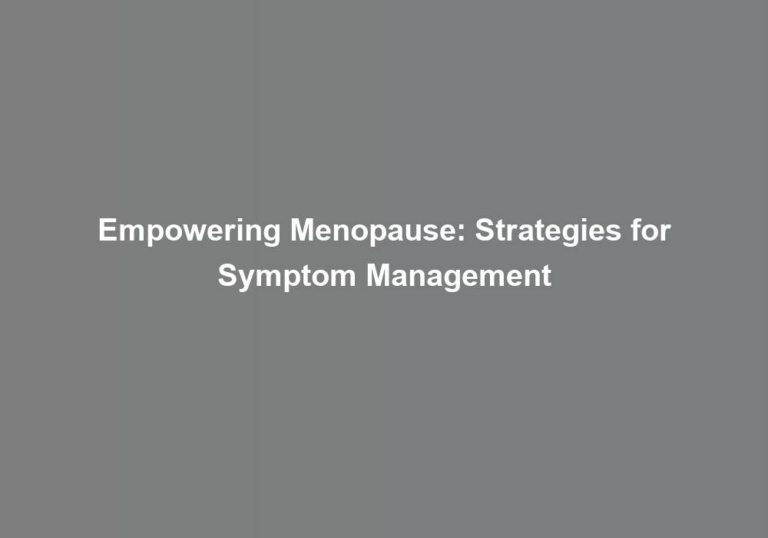Symptom Management: Navigating Menopause with Ease
Imagine waking up in the middle of the night, drenched in sweat, feeling like youG??re trapped in a never-ending heatwave. The frustrating part? YouG??re not the only one. Many women experience this during menopause. But what if you could find relief and navigate this phase of life with ease? There are practical strategies and lifestyle adjustments that can make a significant difference in managing menopausal symptoms. In the next few minutes, youG??ll uncover some effective ways to embrace menopause with confidence and vitality, so you can reclaim control over your well-being.
Understanding Menopause Symptoms
When experiencing menopause, you may notice a variety of symptoms that can affect your daily life. Hormonal changes play a significant role during this time, leading to a range of physical and emotional symptoms. These hormonal fluctuations can cause hot flashes, which are sudden feelings of warmth, often accompanied by sweating and a rapid heartbeat. Hot flashes can be disruptive and uncomfortable, impacting your daily activities and sleep.
Understanding the hormonal changes occurring in your body is crucial for managing menopause symptoms effectively. As estrogen levels decrease, it can lead to a variety of symptoms such as hot flashes. These fluctuations can also contribute to mood swings, irritability, and changes in your menstrual cycle. ItG??s essential to recognize that these symptoms are a natural part of the menopausal transition and that you are not alone in experiencing them.
ItG??s important to seek support and information from healthcare professionals, friends, and family members who can provide understanding and empathy. By creating a supportive network, you can navigate through these changes with more ease and confidence. Additionally, lifestyle adjustments, such as maintaining a healthy diet, staying physically active, and practicing stress-reducing activities, can help alleviate the impact of hormonal changes and hot flashes.
Embracing the understanding that menopause symptoms, including hormonal changes and hot flashes, are a shared experience among many women can provide a sense of belonging and solidarity. Remember, seeking knowledge and support is a powerful step towards managing these symptoms and embracing this new phase of life.
Lifestyle Adjustments for Symptom Management
As you navigate through the challenges of menopause symptoms, implementing lifestyle adjustments can play a crucial role in managing the impact of hormonal changes and hot flashes. Healthy habits are essential for easing menopausal symptoms. Regular exercise, such as walking, swimming, or yoga, can help reduce hot flashes and improve your overall sense of well-being. Additionally, practicing relaxation techniques such as deep breathing, meditation, or tai chi can help alleviate stress and promote better sleep quality.
Dietary changes are also vital in managing menopausal symptoms. Incorporating more fruits, vegetables, and whole grains into your diet can help balance hormone levels and reduce the severity of hot flashes. Avoiding spicy foods, caffeine, and alcohol can also help minimize hot flashes and night sweats. Staying hydrated by drinking plenty of water is crucial for managing symptoms such as vaginal dryness and hot flashes.
Furthermore, maintaining a healthy weight through proper nutrition and portion control is essential for managing menopausal symptoms. Healthy eating habits can also contribute to overall well-being and reduce the risk of other health conditions associated with menopause, such as osteoporosis and heart disease.
Nutrition and Supplements for Menopause
To support your well-being during menopause, incorporating specific nutrients and supplements into your diet can help alleviate symptoms and promote overall health. Making dietary changes is crucial during this phase of life. Increasing your intake of calcium and vitamin D can help maintain bone health, which is especially important as estrogen levels decline. Including more fruits, vegetables, and whole grains in your diet can provide essential vitamins, minerals, and fiber that support overall well-being. Additionally, consuming foods rich in omega-3 fatty acids, such as salmon and flaxseeds, may help reduce the severity of hot flashes and night sweats.
In addition to dietary changes, herbal remedies can offer support during menopause. Black cohosh, for example, has been used traditionally to alleviate hot flashes, while red clover may help with mood swings and sleep disturbances. However, itG??s important to consult with a healthcare professional before incorporating herbal supplements into your routine, as they can interact with other medications or have side effects.
Supplements can also play a role in managing menopausal symptoms. For example, some women find relief from symptoms by taking vitamin E or evening primrose oil supplements. However, itG??s essential to approach supplements with caution and seek guidance from a healthcare provider to ensure they are safe and appropriate for your individual needs.
Exercise and Stress Management Techniques
Incorporate regular physical activity and stress management techniques into your routine to help alleviate menopausal symptoms and support your overall well-being. ItG??s important to recognize the mind-body connection during menopause, as stress can exacerbate symptoms like hot flashes and mood swings. Here are some tips to help you incorporate exercise and stress management techniques into your routine:
-
Mindfulness Meditation: Dedicate a few minutes each day to mindfulness meditation, focusing on your breath and being present in the moment. This can help reduce stress and promote a sense of calm.
-
Yoga or Tai Chi: Engage in gentle activities like yoga or tai chi to promote relaxation, flexibility, and stress reduction. These practices also encourage the mind-body connection, which can be beneficial during menopause.
-
Regular Aerobic Exercise: Incorporate regular aerobic exercise, such as brisk walking, swimming, or cycling, into your weekly routine. Aim for at least 150 minutes of moderate-intensity aerobic activity per week to help manage stress and maintain overall physical health.
-
Social Support and Connection: Engage in activities that promote social support and connection, such as joining a walking group or attending exercise classes with friends. Building a supportive network can provide emotional resilience during this phase of life.
Sleep Hygiene and Restful Nights
You can improve your sleep quality by establishing a consistent bedtime routine and managing stress levels. Creating a calming pre-sleep ritual, such as reading or taking a warm bath, can signal to your body that itG??s time to wind down. Additionally, incorporating stress management techniques into your daily routine, such as mindfulness or deep breathing exercises, can help promote restful nights.
Bedtime Routine
Establishing a consistent bedtime routine is essential for ensuring restful nights and maintaining good sleep hygiene. To help you navigate menopause with ease, consider incorporating the following into your bedtime routine:
- Relaxation techniques: Engage in calming activities such as meditation, deep breathing, or gentle stretching to prepare your mind and body for sleep.
- Create a soothing environment: Dim the lights, play soft music, or use aromatherapy to create a relaxing atmosphere in your bedroom.
- Limit screen time: Avoid electronic devices before bedtime as the blue light emitted can disrupt your bodyG??s natural sleep-wake cycle.
- Consider hormone therapy: Consult with your healthcare provider to discuss whether hormone therapy could be beneficial for managing menopausal symptoms that may be impacting your sleep.
Stress Management
After establishing a consistent bedtime routine to promote restful nights, managing stress is crucial for maintaining good sleep hygiene during menopause. Stress relief is essential for improving sleep quality. Coping strategies like mindfulness meditation, deep breathing exercises, and gentle yoga can help calm your mind and body, making it easier to fall asleep and stay asleep. Additionally, engaging in regular physical activity during the day can reduce stress and promote better sleep at night. ItG??s important to create a soothing bedtime routine, such as taking a warm bath, reading a book, or listening to calming music, to signal to your body that itG??s time to wind down. Prioritizing stress management and incorporating effective coping strategies can greatly contribute to restful nights during menopause.
Embracing Menopause With Confidence
Embracing menopause with confidence involves embracing the changes happening in your body and finding effective ways to manage any symptoms that arise. ItG??s a time to focus on your emotional wellness and adapt to the hormonal changes your body is experiencing. Here are four key ways to help you embrace menopause with confidence:
-
Self-Care: Prioritize self-care by engaging in activities that bring you joy and relaxation. Whether itG??s practicing yoga, going for walks in nature, or indulging in a hobby, taking time for yourself can have a positive impact on your emotional well-being.
-
Support System: Surround yourself with a supportive network of friends, family, or a menopause support group. Having people to talk to and share experiences with can provide a sense of belonging and comfort during this transition.
-
Healthy Lifestyle: Focus on maintaining a healthy lifestyle by eating nutritious foods, staying physically active, and getting enough rest. These habits can help manage hormonal changes and support your overall well-being.
-
Education: Educate yourself about menopause, its symptoms, and treatment options. Understanding what youG??re going through can empower you to make informed decisions and feel more confident in managing this phase of life.
Conclusion
As you navigate the waters of menopause, remember that while it may bring challenges, it also offers opportunities for growth and self-discovery. Embrace the changes with confidence and grace, knowing that you have the knowledge and tools to manage symptoms and thrive. By making small lifestyle adjustments, prioritizing self-care, and seeking support when needed, you can navigate this new chapter with ease and emerge stronger and more empowered than ever before.







